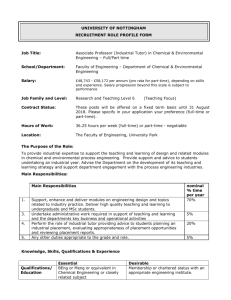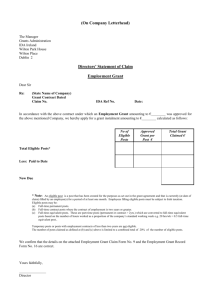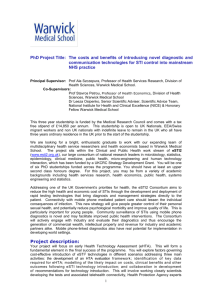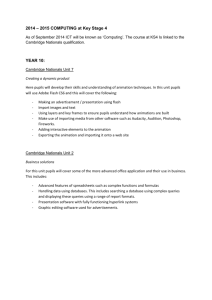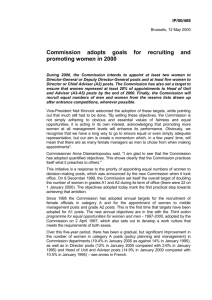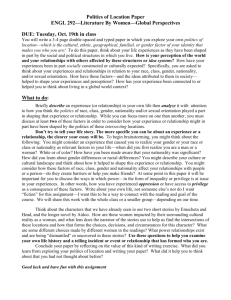Reserved Posts - UK Government Web Archive
advertisement
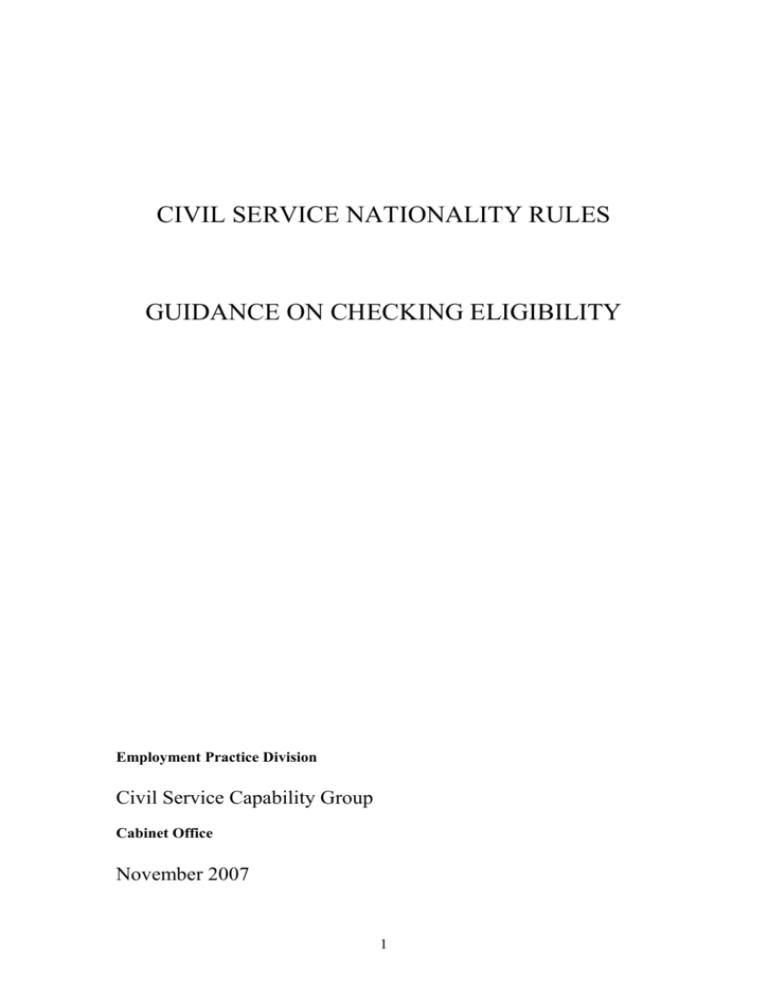
CIVIL SERVICE NATIONALITY RULES GUIDANCE ON CHECKING ELIGIBILITY Employment Practice Division Civil Service Capability Group Cabinet Office November 2007 1 CIVIL SERVICE NATIONALITY RULES GUIDANCE ON CHECKING ELIGIBILITY INDEX Section 1 – Eligibility for employment in the Civil Service on the grounds of nationality Paragraph 1.3: Paragraph 1.4: Paragraph 1.9: Paragraph 1.13: Paragraph1.15: Paragraph 1.16: Paragraph 1.22: Paragraph 1.25: Paragraph 1.28: Paragraph 1.31: Paragraph 1.34: Paragraph 1.43: Paragraph 1.44: Paragraph 1.45: Paragraph 1.46: Paragraph 1.47: Checking eligibility - general UK Nationals Commonwealth Citizens British Protected Persons Eligibility to work in the United Kingdom generally – Commonwealth Citizens and British Protected Persons Irish and other EEA Nationals Worker Registration Scheme Worker Authorisation Scheme – Romanian and Bulgarian nationals Swiss Nationals Turkish Nationals Family Members of EEA, Swiss and qualifying Turkish Nationals Stateless Persons Refugees Asylum Seekers Dual Nationality Race Relations Act 1976 Section 2 – Employment of nationals from countries not covered in Section 1 Paragraph 2.5: Overseas Postings Paragraph 2.7: Aliens’ Certificates Section 3 – Reserved Posts Paragraph 3.4: Paragraph 3.9 : Reserved Posts Reserved Posts – Additional Restrictions 2 CABINET OFFICE GUIDANCE ON THE CIVIL SERVICE NATIONALITY RULES Introduction The Civil Service Nationality Rules (Annex A) govern eligibility for employment in the Civil Service on the grounds of nationality and must be followed by government departments and other bodies within the Home Civil Service and Diplomatic Service in their recruitment and appointment procedures. This Guidance has been prepared by the Cabinet Office and is intended to assist HR practitioners and other administrators in applying the Civil Service Nationality Rules in their pre-appointment procedures. In summary, only nationals from the following countries (or associations of countries) are generally eligible for employment in the Civil Service: the United Kingdom (and British protected persons), the Republic of Ireland, the Commonwealth, the European Economic Area (EEA), Switzerland and Turkey1. Certain family members of EEA, Swiss and Turkish nationals are also eligible regardless of their nationality. Section 1 of the Guidance contains detailed provisions on verifying an applicant’s nationality and thus their eligibility for appointment to the Civil Service. There are certain very limited exceptions to the general prohibition on the employment of nationals from other countries. These are set out in detail in Section 2 of the Guidance. Additional restrictions apply in relation to certain sensitive Civil Service posts. These are known as “reserved posts”. Section 3 contains guidance on eligibility for employment in reserved posts. In general, the Civil Service Nationality Rules do not affect the law regarding eligibility to work in the United Kingdom. Where an employing department or agency has established that a candidate who is recommended for appointment satisfies the Civil Service Nationality Rules, it must, before appointing that candidate, establish in addition that the candidate can work legally in the United Kingdom. This Guidance does not cover the rules governing eligibility to work in the United Kingdom. Information and assistance on the application of the law regarding eligibility to work in the United Kingdom can be found on the Home Office website at www.ind.homeoffice.gov.uk or by contacting the Employers’ Helpline on: 0845 010 6677. Enquiries arising from the Guidance or the application of the Civil Service Nationality Rules can also be addressed to the Cabinet Office, Room 2.6, Admiralty Arch (South), The Mall, London, SW1A 2WH (Tel: 020 7276 1636; Fax: 020 7276 1642; e-mail: mike.dawson@cabinet-office.x.gsi.gov.uk). 1 The countries of the Commonwealth are listed in Annex B. 3 Section 1 - Eligibility for employment in the Civil Service on the grounds of nationality 1.1 In general, only nationals from the following countries (and associations of countries) are eligible for employment in the Civil Service: the United Kingdom, the Republic of Ireland, the Commonwealth, the EEA, Switzerland and Turkey. Certain family members of EEA, Swiss and Turkish nationals are also eligible regardless of their nationality. The Guidance contains detailed provisions on determining eligibility on the grounds of nationality. 1.2 There are certain very limited exceptions which would permit the employment in the Civil Service of nationals from other countries. These exceptions are explained in Section 2 of the Guidance. Checking eligibility – general 1.3 The flowchart at Annex C is designed to assist departments and agencies in determining eligibility on the grounds of nationality. At the application stage, only an initial eligibility check needs to be made. Unless there is any reason for doubt, a candidate’s signed declaration on the application form can be accepted as an indication of eligibility on nationality grounds. Annex F contains suggested nationality questions for application forms. Documentary evidence is only required if a candidate is recommended for appointment. Documents produced by candidates must be valid and current. In cases of documents of doubtful validity, and for other advice on nationality status and letters of confirmation, the Home Office’s Border and Immigration Agency should be consulted on 0845 601 2298. UK Nationals 1.4 UK nationals are in principle eligible for employment in all Civil Service posts. Only UK nationals are eligible for employment in reserved posts. Additional nationality and residency requirements may apply in certain reserved posts. These additional requirements are explained in Section 3 of the Guidance. 1.5 Family members of UK nationals (who are not themselves UK nationals and do not otherwise satisfy the Civil Service Nationality Rules) are not generally eligible to join the Civil Service.2 1.6 The definition of UK national is set out in the UK Declaration on Nationality, made with effect from 1 January 1983 and comprises: British citizens, British subjects under Part IV of the British Nationality Act 1981 having the right of abode in the United Kingdom, and British Overseas Territories citizens. 2 Exceptionally, the family members of a UK national who do not themselves meet the Nationality Rules may be eligible to join the Civil Service if the UK national has triggered his or her freedom of movement rights under European Community law (normally by working elsewhere in the EEA for a period). Where a department or agency thinks that an individual may be eligible on these grounds, the Cabinet Office must be consulted in the first instance. 4 1.7 The following paragraphs set out the documentary evidence which should be provided by candidates who are recommended for appointment. British citizens born in the United Kingdom British passport confirming birth in the United Kingdom and showing national status as either “British citizen” or “Citizen of the United Kingdom and Colonies”; or letter from the Home Office confirming British citizenship. British citizens born abroad British passport showing national status as either “British citizen” or “Citizen of the United Kingdom and Colonies” and, if the latter, containing right of abode endorsement; or letter from the Home Office confirming British citizenship. British citizens by registration or naturalisation naturalisation or registration certificate; or British passport showing national status as either “British citizen” or “Citizen of the United Kingdom and Colonies” and, if the latter, containing right of abode endorsement; or letter from the Home Office confirming British citizenship. British Overseas citizens, British Overseas Territories citizens, British Nationals (Overseas) and British subjects British passport showing national status as “British Overseas Citizen”, “British Overseas Territories Citizen”, “British Nationals (Overseas)” or “British Subject”; or letter from the Home Office confirming citizenship or status. 1.8 Usually there will be no restrictions on the entitlement of UK nationals to work in the United Kingdom generally. In cases of doubt, however, the Home Office should be consulted before the appointment is made. Commonwealth Citizens 1.9 Commonwealth citizens are eligible for employment in all non-reserved posts in the Civil Service. They are not eligible for employment in reserved posts unless they were in the Civil Service at 31 May 1996 or before, or were appointed from a recruitment scheme with a closing date for receipt of applications before 1 June 1996. In this case, they have a right of access to reserved posts for the duration of their careers provided that there is no break in service. Family members of Commonwealth citizens who are not themselves Commonwealth citizens and do not otherwise satisfy the Civil Service Nationality Rules are not eligible to join the Civil Service. 5 1.10 A “Commonwealth citizen” is any person who has the status of a Commonwealth citizen under the British Nationality Act 1981. The territories forming part of the Commonwealth are listed in Annex B of the Guidance. 1.11 A candidate from a Commonwealth country who is recommended for appointment is required to provide as documentary evidence either a passport, or an official letter from the relevant national authority confirming citizenship. 1.12 Where a Commonwealth citizen has acquired citizenship of another country by a formal act such as naturalisation (and nationals of that country would not satisfy the Civil Service Nationality Rules), departments and agencies should take care to ensure that the documentary evidence provided by candidates indicates that they have retained their status as a Commonwealth citizen. British Protected Persons 1.13 British protected persons are eligible for employment in all non-reserved posts in the Civil Service. They are not eligible for employment in reserved posts. Family members of British protected persons (who are not themselves British protected persons and do not otherwise satisfy the Civil Service Nationality Rules) are not eligible to join the Civil Service. 1.14 The definition of British protected person is determined under the British Nationality Act 1981. Very few candidates will fall into this category. British protected persons who are recommended for appointment are required to provide either a British passport which demonstrates their status as a British protected person or a letter from the Foreign and Commonwealth Office confirming their status. Eligibility to work in the United Kingdom generally – Commonwealth Citizens and British Protected Persons 1.15 Before appointing candidates who are Commonwealth citizens or British protected persons, departments and agencies must be satisfied that the individuals concerned can work legally in the United Kingdom. The Home Office should be consulted on any queries about the eligibility of a candidate to work in the United Kingdom. Irish and other EEA Nationals 1.16 Irish nationals are eligible for employment in all non-reserved posts in the Civil Service. They are not eligible for employment in reserved posts unless they were in the Civil Service at 31 May 1996 or before, or were appointed from a recruitment scheme with a closing date for receipt of applications before 1 June 1996. In this case, they have a right of access to reserved posts for the duration of their careers provided that there is no break in service. 1.17 An Irish national who is recommended for appointment is required to provide as documentary evidence either a Republic of Ireland birth certificate, a national passport confirming Irish citizenship or a letter from the Irish authorities confirming citizenship. 6 1.18 The family members of Irish nationals are also eligible for employment in non-reserved posts in the Civil Service in the same way as family members of other EEA nationals (see paragraphs 1.34 and 1.35 concerning EEA family members). 1.19 An EEA national is a national of the European Economic Area (EEA). The EEA comprises the Member States of the European Union and Norway, Iceland and Liechtenstein. The current members of the EU are: Austria, Belgium, Bulgaria, Cyprus, Czech Republic, Denmark, Estonia, Finland, France, Germany, Greece, Hungary, Ireland, Italy, Latvia, Lithuania, Luxembourg, Malta, the Netherlands, Poland, Portugal, Romania, Slovakia, Slovenia, Spain, Sweden and the United Kingdom. 1.20 EEA nationals are eligible for employment in all non-reserved posts in the Civil Service. 1.21 An EEA national who is recommended for appointment is required to provide as documentary evidence either a national passport confirming citizenship, a letter from the authorities of the Member State confirming citizenship, or a national identity card confirming citizenship. Worker Registration Scheme 1.22 EEA nationals do not generally need work permits in order to take up employment in the United Kingdom. However, certain conditions and restrictions apply to nationals of those Member States who acceded to the EU in 2004 and 2007. 1.23 There are certain conditions on the nationals of eight of the ten Member States who joined the EU in 2004 (the Czech Republic, Hungary, Estonia, Latvia, Lithuania, Poland, Slovakia, Slovenia). These restrictions apply until 30 April 2009. Non-exempt workers from these eight Member States generally have to apply to the Home Office for a registration certificate within the first month of their employment in order to continue to work legally in the United Kingdom. Departments and agencies need to ensure that the application for registration is made within the first month of appointment. The Home Office should be consulted for advice on the registration procedure and on those workers who are exempt from the Scheme. 1.24 More detailed guidance on the Workers Registration Scheme can be accessed at http://www.workpermit.com/uk/worker_registration_scheme or on the Employers’ Helpline on 0845 010 6677. Worker Authorisation Scheme – Romanian and Bulgarian nationals 1.25 There are some additional restrictions on the entitlement of Bulgarian and Romanian nationals to enter and work in the United Kingdom. These restrictions will apply until 31 December 2011. 1.26 During the period to 31 December 2011, non-exempt Bulgarian and Romanian nationals are only eligible to work in the Civil Service if the employing department or 7 agency obtains prior approval for the employment in accordance with the arrangements set down in the Worker Authorisation Scheme. 1.27 Departments or agencies who intended to appoint a Bulgarian or Romanian national should consult the Home Office for advice on the requirements of the Worker Authorisation Scheme and on those Bulgarian and Romanian nationals who are subject to the Scheme. Bulgarian and Romanian nationals who are exempt from the Worker Authorisation Scheme are free to take up employment in non-reserved posts in the Civil Service. Swiss Nationals 1.28 Swiss Nationals have the same entitlement as EEA nationals to take up employment in non-reserved posts in the Civil Service. 1.29 A Swiss national who is recommended for appointment is required to provide as documentary evidence either a national passport confirming citizenship, a letter from the Swiss authorities confirming citizenship, or a national identity card confirming citizenship. 1.30 As with EEA nationals, there are generally no restrictions on the entitlement of Swiss nationals to work in the United Kingdom. In cases of doubt, however, the Home Office should be consulted. Turkish Nationals 1.31 Turkish nationals are not automatically eligible for employment in nonreserved posts in the Civil Service. They are only eligible if they have been lawfully employed in the United Kingdom for four years in any job, or if they have been lawfully employed for three years in a job within the same “occupation” as the post which they wish to take up within the Civil Service. 1.32 A Turkish national who is recommended for appointment is required to provide as documentary evidence either a national passport or national identity card confirming citizenship, or a letter from the Turkish authorities confirming citizenship. 1.33 Documentary evidence is also required to establish that the conditions concerning lawful employment in the United Kingdom have been met (described above at paragraph 1.31). Departments and agencies should contact the Home Office for advice on the documentation which is required to establish that the candidate meets the lawful employment requirements. Family Members of EEA, Swiss and qualifying Turkish Nationals 1.34 Certain family members of EEA nationals irrespective of their nationality are eligible to take up employment in the Member State where that national is employed. This means that family members of EEA nationals employed in the United Kingdom would also be eligible to be employed in the United Kingdom and therefore to be employed in non-reserved posts in the Civil Service (even if they do not themselves otherwise satisfy the Civil Service Nationality Rules). 8 1.35 The family members concerned are the spouse or civil partner of the EEA national, and the direct descendants of the EEA national or their spouse or civil partner (e.g. children and grandchildren). Direct descendants only qualify if they are under the age of 21 or are dependants. Dependent direct relatives in the ascending line of the EEA national or their spouse or civil partner (e.g. parents and grandparents) are also included. 1.36 Where a long-term partner or other dependant of an EEA national is lawfully resident in the United Kingdom,3 he or she may be eligible for appointment to the Civil Service. The Cabinet Office must be consulted, however, before the appointment of EEA family members in this category. 1.37 Certain family members of Swiss nationals resident in the United Kingdom, who are not themselves Swiss and would not otherwise satisfy the Civil Service Nationality Rules, have rights to reside and to take up employment in the Member State where that national is employed. This means that family members of Swiss nationals employed in the United Kingdom would also be eligible to be employed in the United Kingdom and therefore to be employed in non-reserved posts in the Civil Service. 1.38 The family members concerned are the spouse of the Swiss national, the direct descendants of the Swiss national (e.g. children, grandchildren, etc.) who are under the age of 21 or are dependants, and their dependent relatives in the ascending line (e.g. parents, grandparents, etc.). In the case of a Swiss national who is a student, rights only extend to the spouse and any dependent children of the Swiss national. These family members can work in the United Kingdom and are eligible for employment in non-reserved posts in the Civil Service. 1.39 Certain family members of Turkish nationals who qualify for employment in the Civil Service are themselves also eligible for employment in the Civil Service. Family members of Turkish nationals are only eligible for employment in nonreserved Civil Service posts if they have been lawfully resident in the United Kingdom for three years or more. 1.40 The family members concerned are the Turkish national’s spouse and the direct descendants of either the Turkish national or the spouse (children, including step-children, grandchildren, great-grandchildren) who are under the age of 21 years or are dependants. Also included are direct dependent relatives in the ascending line of the Turkish national or the spouse (parents, grandparents, great-grandparents). 1.41 In order for the family member to be eligible for employment in the Civil Service, they must have been living in the United Kingdom with the qualifying Turkish national. There are also special rules which entitle the children of the 3 The relevant European Community Directive requires Member States to consider whether to grant residence to those family members who, in the country from which they have come, were a dependant of that national or a member of their household, or where serious health grounds strictly require the personal care of the family member by the EEA national. Member States must also consider whether to grant residence to long-term partners. Where this residence is granted, the individual would be eligible for appointment to the Civil Service. 9 qualifying Turkish national who have completed a course of vocational training in the United Kingdom to take up jobs in the Civil Service. There is no length of residence requirement for this right, but either the Turkish national or the other parent of the child must have been legally employed in the United Kingdom for at least three years. 1.42 Candidates who are recommended for appointment are required to provide a passport or other document issued by the Home Office which has an endorsement stating that the holder has a current right of residence in the United Kingdom as a family member of a national from an EEA country, Switzerland or Turkey. In relation to the family members of Turkish nationals, the Cabinet Office recommends that the Home Office is consulted in all cases so as to ensure that the candidate meets the requirements described above for lawful employment in the United Kingdom. Stateless Persons 1.43 Stateless persons are not eligible for appointment to the Civil Service even if they had past connections with the United Kingdom or the Commonwealth. Refugees 1.44 A refugee does not automatically lose his or her nationality. It must either be taken away by the government of the country concerned, or the candidate must have voluntarily renounced it. Candidates who state that they are refugees should be asked to confirm in writing whether or not either of those actions has taken place. If the answer is “Yes”, the candidate is ineligible because they are stateless. If the answer is “No”, it should be accepted without checking with the embassy of the country concerned. If such a check is made, the candidate’s citizenship could be stripped and relatives in the country concerned put in danger. The candidate’s eligibility will therefore depend on nationality status in the normal way. The Home Office should be consulted in the event of refugee candidates who claim to retain their nationality of origin. Asylum Seekers 1.45 Asylum seekers are in principle eligible for appointment to the Civil Service provided that they satisfy the Civil Service Nationality Rules and are able to work legally in the United Kingdom. An asylum seeker who is recommended for appointment should be required to provide, in addition to documentary evidence confirming their nationality, an application Registration Card from the Home Office stating that they are permitted to take up employment. The Cabinet Office recommends that the Home Office is consulted in all cases concerning the appointment of asylum seekers. 10 Dual Nationality 1.46 Candidates with dual nationality are in principle eligible for employment in the Civil Service provided that they meet the requirements in relation to one of their nationalities. They may not be eligible, however, for employment in certain reserved posts where additional nationality requirements are imposed. Race Relations Act 1976 1.47 The operation of the Civil Service Nationality Rules is excluded from the provisions of the Race Relations Act 1976. The operation of the Rules does not therefore constitute an infringement of that Act. This exception also applies to the bodies listed in Annex E. These bodies also apply the Civil Service Nationality Rules. 11 Section 2 – Employment of Nationals from Countries not covered in Section 1 2.1 “Alien” is the legal term for a person who is not an Irish or Commonwealth citizen, or a British protected person. It is generally illegal to employ an alien in the Civil Service. 2.2 EEA, Swiss and Turkish nationals are “aliens” but are eligible to work in most Civil Service posts as a result of free movement rights acquired under European law. These rights extend to certain of their family members. The rules concerning the employment of these European nationals in the Civil Service operate as an exception to the general prohibition on the employment of aliens in the Civil Service. Section 1 contains detailed guidance on the operation of this exception. 2.3 There are only two other exceptions to the general prohibition on the employment of aliens in the Civil Service: for certain overseas postings and for employment under cover of an alien’s certificate. These exceptions are explained in detail in this Section. 2.4 A candidate who is a national from a country not covered in Section 1 and who cannot be employed under one of these exceptions is not eligible for appointment to any Civil Service post. Overseas Postings 2.5 The first exception relates to certain overseas postings. An alien may be appointed to an overseas post of a class or description which the Minister responsible for the Civil Service considers appropriate for the employment of aliens. An overseas post means a post in a country or territory outside the United Kingdom, Channel Islands or the Isle of Man. 2.6 This exception applies mainly to appointments of local staff posts in UK embassies and consulates overseas and so is primarily of relevance to the Foreign and Commonwealth Office, Department for International Development and Ministry of Defence. Any other department or agency recruiting to overseas posts which they consider may fall within this exception should in the first instance contact the Cabinet Office for guidance. Aliens’ Certificates 2.7 The second exception enables the employment of aliens under cover of an alien’s certificate issued by the department concerned with the consent of the Minister for the Civil Service. 2.8 A certificate can cover the employment of a particular individual in a particular post or the employment of aliens generally in particular posts or in posts of a particular class or description. 2.9 A certificate can only be issued in relation to the employment of a particular individual in a particular post if: 12 there is no suitably qualified UK national available for employment in that post; or the alien possesses exceptional qualifications or experience for employment in that post. 2.10 Other certificates (including those covering the employment of aliens in posts of a particular class or description) may only be issued if suitably qualified UK nationals are not readily available, or available in sufficient numbers for employment in the post or class or description of the posts specified in the certificate. 2.11 If a certificate is issued, the candidate must be given a conditional (nationality) appointment. The normal recruitment procedures for the grade must also be followed and the candidate must be otherwise eligible for appointment in respect of age, health, character, knowledge and ability. 2.12 A certificate is only valid for a period of five years, although on its expiry the Minister may issue a further certificate if the conditions described in paragraphs 2.9 or 2.10 continue to apply. If the candidate subsequently becomes eligible for permanency, for example through naturalisation, the appointment may be converted to a permanent one. 2.13 The employing department or agency will be required in the first instance to establish that the candidate can work legally in the United Kingdom. The Home Office should therefore be consulted on the procedure applicable for determining the eligibility of the candidate to work in the United Kingdom. 2.14 When it has been established that there are no restrictions on the candidate taking up employment in the United Kingdom or on their length of stay in the United Kingdom, approval for issue of the certificate should be sought from the Cabinet Office, Room 2.6, Admiralty Arch (South), The Mall, London SW1A 2WH (Tel: 020 7276 1636, Fax: 020 7276 1642). 2.15 The letter to the Cabinet Office seeking such approval should: a) confirm either that there are no restrictions on the candidate taking up employment or that the Home Office has given the necessary clearance; b) confirm that no suitable person, eligible under the Nationality Rules, is available for employment in that post or that the alien possesses exceptional qualifications or experience for appointment to that post; c) confirm that the post is a non-reserved post; d) give details of when and where the post was advertised and state the number of applications received and the results of any interviews held; e) attach a draft certificate for the employment of the alien (see Annex D). 13 2.16 As stated above, certificates are valid for five years but may be renewed at the end of that period if the circumstances at that time justify the continued employment of the person in the post. Before a certificate expires, steps must be taken to replace the individual with a suitably qualified person eligible under the Nationality Rules. If this does not prove to be possible, the procedure set out in paragraph 2.15 above must be followed before the certificate can be renewed. The employing department or agency must also be satisfied that the individual concerned continues to meet all immigration requirements and continues to be eligible to work in the United Kingdom. 14 Section 3 – Reserved Posts 3.1 Only UK nationals may be employed in reserved posts in the Civil Service. Reserved posts are generally those which, due to the sensitive nature of the work, require special allegiance to the Crown such that they can only be held by a UK national. 3.2 Under no circumstances may any other nationals be employed in reserved posts. 3.3 This Section contains guidance on those posts which are, and those which are capable of being, reserved for UK nationals. Reserved Posts 3.4 All posts within the security and intelligence services (that is, the Security Service, the Secret Intelligence Service, and the Government Communications Headquarters) are automatically reserved to UK nationals. 3.5 Certain other categories of posts are capable of being reserved if the Minister responsible for the department or agency considers that to be necessary (that is, that special allegiance to the Crown is required in respect of that post such that the post must be held by a UK national). 3.6 These categories of posts are: - posts within the Defence Intelligence Staff within the Ministry of Defence; and posts whose functions are concerned with: (i) access to intelligence information received directly or indirectly from the security and intelligence services; (ii) access to other information which, if disclosed without authority or otherwise misused, might damage the interests of national security; (iii) access to other information which, if disclosed without authority or otherwise misused, might be prejudicial to the interests of the United Kingdom or the safety of its citizens; (iv) border control or decisions about immigration. Where a post falls within one of the categories in this paragraph the Minister responsible for the department or agency must consider whether it is necessary to reserve that post for UK nationals only. Where the responsible Minister does not consider that to be necessary, the post will not be reserved for UK nationals. 3.7 In relation to posts within the Diplomatic Service and the Foreign and Commonwealth Office, it has been determined that special allegiance to the Crown is 15 required in respect of these posts such that it is necessary to reserve these posts to UK nationals. Therefore only UK nationals are eligible for employment in posts in the Diplomatic Service and the Foreign and Commonwealth Office4 unless the responsible Minister decides otherwise in relation to a specified post or posts. 3.8 If a post does not fall within these categories, then it is not capable of being reserved to UK nationals only. This means that the post is open to other nationals who satisfy the Civil Service Nationality Rules (see section 1 for Guidance on those nationals who may be employed in the Civil Service). Reserved Posts – Additional Restrictions 3.9 UK nationals are in principle eligible for employment in all Civil Service posts. However, departments and agencies are entitled to impose additional requirements in reserved posts if this is considered necessary. 3.10 This could include, for example, requirements as to the residency of the applicant or the nationality of one or both parents of the applicant. 3.11 For posts in the Diplomatic Service and Home Civil Service posts in the Foreign and Commonwealth Office, individuals are only eligible if: (a) they are a British citizen; and (b) they have resided in the United Kingdom for at least two of the previous ten years immediately prior to their application, at least one year of which must have been a consecutive twelve-month period, unless they have served overseas with HM Forces or in some other official capacity as a representative of Her Majesty’s Government, or have lived overseas as a result of their parents’ or partner’s government employment. A lack of sufficient background information may preclude them from being granted security clearance. Cabinet Office November 2007 4 Except for those local staff in FCO posts abroad. These posts are open to persons regardless of their nationality. See paragraphs 2.5 and 2.6 above. 16
